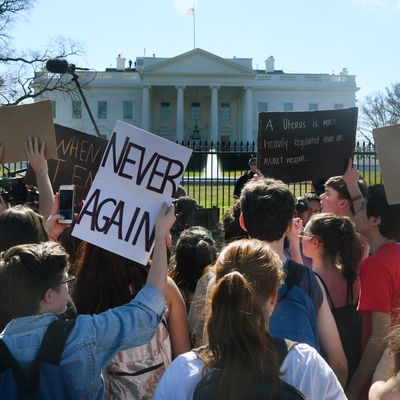
In an effort to show he’s heeding calls to address gun violence after the school shooting in Parkland, Florida, last week, President Trump has thrown out many vague ideas, including arming teachers, raising the age for gun purchases, opening more mental institutions, and creating a ratings system for video games (which already exists). He’s also mentioned several times that we’re “going to be very strong on background checks.”
Now the Trump administration is getting more specific, but much like the president’s order for the Justice Department to work toward banning bump stocks, it’s unclear if his latest move will actually accomplish anything.
The New York Times reports that in the coming days the Justice Department plans to tell U.S. attorneys to prioritize prosecutions of people who lie on federal background-check forms while attempting to purchase a gun.
This move would theoretically strengthen an existing law, as lying on the six-page application to buy a firearm is already a felony. While thousands of firearm applications are denied each year, the Times notes that between 2008 and 2015 only 32 were considered for prosecution. However, it’s unclear if U.S. attorneys will actually heed the new directive, and what happens if they don’t.
Even if the order is rigorously enforced, it’s hard to see prosecutions having a major impact on the strength of the background-check system. The far bigger issue is the so-called “gun-show loophole”; only federally licensed gun sellers are required to run background checks. A recent survey of 1,613 adult gun owners found that 22 percent purchased their last firearm from private sellers without a background check.
Alleged Florida shooter Nikolas Cruz passed a background check before purchasing his weapons, as he had no criminal or mental-health history that would have been entered into the federal system. In some other recent mass shootings, the issue was that the background-check system failed. Dylann Roof, who murdered nine people in a Charleston, South Carolina, church in 2015, had a felony drug-possession charge, but he exploited the three-day waiting period loophole. The FBI couldn’t come up with an answer on whether his application should be approved, so three days later he was allowed to buy a gun. Devin Kelley, who killed 26 people in a Texas church in November, should have been denied because he was kicked out of the Air Force for a domestic-violence conviction, but the records were never transferred to the FBI.
Trump now supports the Fix NICS Act, which aims to improve reporting to the FBI, but that’s a tweak that wouldn’t do anything to close the larger loopholes in the background-check system. And Congress may not even be willing to pass that legislation.
The Fix NICS Act probably has enough bipartisan support to pass both chambers, but last November GOP leaders chose to attach it to the Concealed Carry Reciprocity Act. The effort to make concealed-carry permits work across state lines passed in the House, but won’t make it out of the Senate.
The Fix NICS Act is the mildest gun measure before Congress, and even the National Rifle Association supports it. But Politico reports that the bill is still likely to fail in the Senate if Majority Leader Mitch McConnell even allows a vote. One senator can block quick passage of the bill, and Senators Mike Lee, John Kennedy, and Rand Paul oppose the legislation as written. Plus, the leadership has already promised House Republicans that the background-check fix won’t be separated from the controversial concealed-carry bill.
Minor Executive-branch tweaks to existing laws may be the only movement we see on the issue of gun violence for some time. Despite the movement started by Parkland survivors and a recent poll that shows 97 percent of American voters support universal background checks, Republican congressional leaders appear unwilling to budge, and so far the White House isn’t putting significant pressure on them.






























